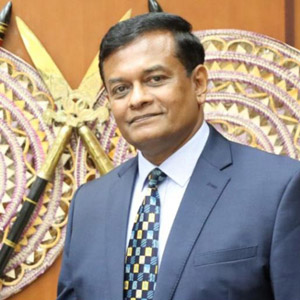DG’s plan to transform Sri Lanka’s sporting landscape

Dr. Shamal Fernando
In a move aimed at transforming Sri Lanka’s sporting landscape, the Ministry of Sports under the leadership of Director General of Sports Dr. Shamal Fernando has launched a comprehensive four-year plan targeting the 2028 Olympic Games. This initiative marks a significant departure from previous practices, focusing on enhancing athlete support, infrastructure development, and regulatory reforms across various sports federations.
Appointed to his role just over 11 months ago, Fernando reflected on the challenges and motivations that drove him to spearhead this transformative agenda.
“When I was appointed, I never imagined the extent of the responsibility that would fall on my shoulders,” Fernando remarked.
Having served the Navy and then working in the private sector, his deep passion for sports forced him to embrace the challenge wholeheartedly.
“I knew we needed a strategic plan,” Fernando emphasised, outlining his vision rooted in comprehensive research and identified pillars crucial for Sri Lanka’s sports development. Drawing from his extensive experience and insights gained from various international bodies, Fernando articulated a clear roadmap that would position Sri Lanka competitively on the global stage of sports.
The journey began with tackling longstanding institutional and infrastructural challenges within the sports ecosystem. Fernando recounted the arduous process of resolving numerous court cases plaguing sports federations across the country.
“We spent countless hours at the Supreme Court, seeking solutions and engaging with international bodies to facilitate resolutions,” Fernando explained.
His efforts bore fruit, with a significant reduction in pending legal disputes, paving the way for federations to focus on development rather than legal battles. One of the early triumphs under Fernando’s leadership was the successful participation of Sri Lanka’s rugby sevens team in the Asian Games, achieved through diligent coordination with World Rugby and Asian rugby bodies.
“Despite time constraints, we ensured the team received adequate training and support,” Fernando remarked, underscoring the collaborative efforts that yielded positive international recognition for Sri Lankan rugby.
Central to Fernando’s strategy is the unprecedented financial support provided to athletes and coaches, a first in Sri Lanka’s sporting history.
“From January onwards, we have allocated stipends across different tiers, ensuring athletes and coaches are adequately supported in their Olympic preparations,” Fernando stated.
This financial backing aims not only to alleviate the financial burdens on athletes but also to foster an environment conducive to achieving sporting excellence. Moreover, Fernando’s tenure has witnessed a significant overhaul of sports infrastructure across the island.
“When I assumed office, several key facilities were in disrepair,” Fernando recalled, highlighting his efforts to revitalise swimming pools, tracks, and stadiums nationwide. Projects in Gampaha, Bingiriya,
and Ratnapura exemplify Fernando’s commitment to providing athletes with world-class training facilities essential for their development.
Addressing the regulatory framework governing sports federations, Fernando emphasised the need for streamlined governance and accountability.
“We have embarked on a process of updating constitutions and ensuring adherence to international standards,” Fernando noted.
This regulatory overhaul seeks to enhance transparency and efficiency within sporting bodies, fostering a conducive environment for growth and sustainability. Looking ahead, Fernando remains optimistic about Sri Lanka’s prospects at the upcoming Olympic Games and beyond.
“Our goal is not just participation but meaningful achievement on the global stage,” he affirmed.
The ongoing initiatives, including the National Sports Council’s revitalised role and enhanced medical and nutritional support for athletes, are poised to elevate Sri Lanka’s sporting prowess. Despite the strides made, Fernando acknowledged the challenges ahead, particularly regarding financial constraints and the need for continued stakeholder cooperation.
“Securing sponsorships and additional funding remains a critical challenge,” he conceded, highlighting ongoing efforts to attract private sector investments in sports development.Reflecting on his tenure thus far, Fernando expressed gratitude for the unwavering support from athletes, coaches, and stakeholders.
“Their dedication and resilience are the driving force behind our collective efforts,” he remarked, underscoring the collaborative spirit that has defined Sri Lanka’s sports transformation under his stewardship. With the four-year plan now in motion, all eyes are on the nation’s athletes as they prepare to showcase their prowess on the world stage, guided by a renewed sense of purpose and commitment to excellence.


